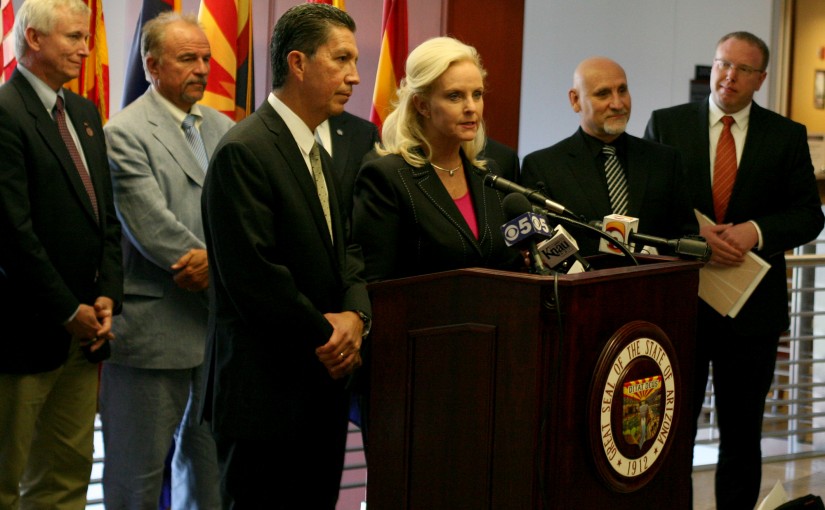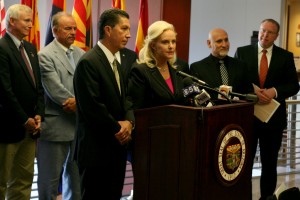Looming Super Bowl helps drive efforts to toughen state’s trafficking laws

Cronkite News
With the clock ticking down to the 2015 Super Bowl, nonprofits and advocates are already working to raise awareness about sex trafficking and persuade lawmakers to toughen laws.
Advocates say that sex trafficking increases around sporting events, and the Super Bowl in particular. That was a consideration when a committee appointed by Gov. Jan Brewer made recommendations for new laws and policies in September.
“We want to send the message to traffickers: ‘You’re not welcome here,’” Cindy McCain, the committee’s co-chair, said at the time.
McCain and the committee, which consisted of advocates, elected officials and law enforcement officers, heard testimony from nonprofits, survivors of sex trafficking and concerned community members.
Among 27 other recommendations, the committee said Arizona should impose the same harsh sentences on johns and pimps in all sex trafficking cases involving minors, regardless of the victim’s age.
Taryn Offenbacher, spokeswoman for Shared Hope International, said state penalties for johns and pimps make a big difference in where human trafficking takes place.
“We know that buyers know where sentences are tougher, and traffickers definitely know,” she said.
The task force’s recommendations would help make trafficking less common in the state, and not just around the Super Bowl, Offenbacher said.
“If the recommendations are largely implemented in Arizona, the state will be stronger for it,” she said. “The Super Bowl is not the be-all, end-all for trafficking.”
In Indiana, nonprofits and law enforcement worked together to prevent sex trafficking around the 2012 Super Bowl. Abby Kuzma, deputy attorney general, said groups learned from advocates in Dallas, site of the previous Super Bowl, that a lack of public awareness and coordination between law enforcement and advocacy groups hampered efforts there.
“They literally had groups sort of stepping on each other’s toes,” she said. “There was very little effort to coordinate anything.”
Kuzma said Indiana’s planning group invited all nonprofits that were working in human trafficking to join the effort and standardized training materials to keep their messages consistent.
Advocates handed out thousands of fliers and brochures and held dozens of outreach meetings in the months before the game, in addition to training law enforcement, church groups and members of the hospitality industry.
Kuzma said Indiana fast-tracked a law that toughened penalties shortly before the Super Bowl, with unprecedented support from the state Legislature and the governor.
Previously, prosecutors had to prove victims of sex trafficking under 18 were performing sex acts against their will in order to use Indiana’s sex trafficking law against buyers and pimps. The 2012 measure made it easier in cases involving victims 16 or younger to sentence johns more harshly.
“The votes were unanimous every time, at every stage of the process,” Kuzma said. “That was incredible.”
The following year, Indiana’s Legislature changed the law again, raising the age to 18. Federal law says that anyone under the age of 18 cannot consent to prostitution – any commercial sex act between a minor and an adult is considered sex trafficking.
Kathleen Winn, director for outreach and education in the Arizona Attorney General’s Office, said groups working to stop sex trafficking in the state are using the Super Bowl as a way to raise awareness.
“We know that more sex trafficking occurs around the Super Bowl,” she said. “We’re using that as a vehicle to inform people about underage sex trafficking.”
Winn said her office hopes to propose legislation that would increase penalties for buyers if they’re caught with underage victims, whether they claim ignorance or not.
“If you get caught with a 14-year-old child or younger, there are pretty strict penalties,” she said. “But we don’t have penalties for 15-, 16- or 17-year-olds.”
Winn said that after a similar proposal was never taken up by House last year, groups are redoubling their strength and adding educated advocates every day.
“People don’t believe it’s happening here, so that’s the first issue,” she said. “They’re like, ‘That’s not happening here.’ But it is happening here. So there’s showing where it’s happening, how it’s happening, why it’s happening. It’s an education process.”
Winn said one goal is changing the conversation regarding who the girls are to establish them as victims, not prostitutes.
“We believe that they’re victimized because they’re children,” she said. “Children can’t legally enter into contracts. If they can’t enter into contracts and they’re being bought and sold and they’re not getting the profit, that’s human trafficking, slave trafficking.”
Katie Resendiz, executive director of TRUST (Training and Resources United to Stop Trafficking), said her organization tries to bring together diverse groups working to end human trafficking in Arizona and get everyone on the same page.
Resendiz said TRUST’s mission far exceeds what can be done in time for the Super Bowl but that making changes for the game would be a strong step in the right direction.
“What better venue to raise awareness than the Super Bowl?” she said.
Committee recommendations:
• Authorize victims of human trafficking to bring civil lawsuits against those responsible.
• Establish an ongoing committee to address human trafficking in Arizona.
• Explore a judicial review process to allow victims to remove low-level offenses related to forced prostitution from their criminal records.
• Require posting of a hotline number in places where victims are most likely to come into contact with it, such as strip clubs and other sexually oriented businesses.
• Require consistent basic training on human trafficking for prosecutors, the hospitality industry, child welfare workers and other professions to help them identify and assist victims.
• Collect and track trafficking data.















